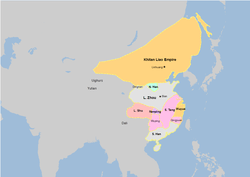Northern Han
| Han | ||||||||||
| 漢 | ||||||||||
| ||||||||||
 Northern Han shown in greenish blue | ||||||||||
| Capital | Taiyuan | |||||||||
| Languages | Chinese | |||||||||
| Religion | Buddhism, Taoism, Confucianism, Chinese folk religion | |||||||||
| Government | Monarchy | |||||||||
| Emperor | ||||||||||
| • | 951–954 | Emperor Shizu | ||||||||
| • | 954–968 | Emperor Ruizong | ||||||||
| • | 968 | Emperor Shaozhu | ||||||||
| • | 968–979 | Emperor Yingwudi | ||||||||
| Historical era | Five Dynasties and Ten Kingdoms Period | |||||||||
| • | Established | 951 951 | ||||||||
| • | Ended by the Song Dynasty | 979 979 | ||||||||
| Currency | Chinese cash, Chinese coin, copper coins etc. | |||||||||
| ||||||||||
| Today part of | | |||||||||
The Northern Han kingdom (simplified Chinese: 北汉; traditional Chinese: 北漢; pinyin: Běi Hàn) was a state of the Five Dynasties and Ten Kingdoms period. It was founded by Liu Min (劉旻), formerly known as Liu Chong (劉崇), and lasted from 951 to 979.
Founding of the Northern Han
The short-lived state of Later Han fell in 950. Liu Min founded the Northern Han Kingdom, sometimes referred to as the Eastern Han, in 951 claiming that he was the legitimate heir to the imperial throne of Later Han. Liu Min immediately restored the traditional relationship with the Khitans, who had founded the Liao Dynasty.
Sources conflict as to the origin of the Later Han and Northern Han emperors; some indicate sinicized Shatuo ancestry[1][2] while another claims that the emperors claimed patrilineal Han Chinese ancestry.[3]
Territorial extent
The Northern Han was a small kingdom located in Shanxi with its capital located at Taiyuan. Shanxi had been a traditional base of power since the fading days of the Tang Dynasty in the late ninth century and early tenth century. It was wedged between the two major powers of the day, the Liao Dynasty to the north and the Song Dynasty to the south. It also shared a border with the Tangut kingdom of Western Xia.
Wedge between Liao and Song
The existence of the Northern Han was one of the two major thorns in relations between the Liao Dynasty and the Song Dynasty, the other being the continued possession of the Sixteen Prefectures by the Liao Dynasty. The Northern Han had placed itself under the protection of the Liao.
Emperor Taizu was successful in nearly completing the incorporation of the southern kingdoms into the Song Dynasty by his death in 976. His younger brother, Emperor Taizong wished to emulate his older brother’s successes. Wuyue was brought into the realm in 978.
Fall of the Northern Han
Emboldened by his success to the south, Emperor Taizong decided to embark on a campaign to finally destroy the Northern Han. Leading the army himself, he brought his forces to the Northern Han capital of Taiyuan, which was laid under siege in June. An initial relief force sent by the Liao was easily defeated by Song. After a two-month siege of the capital, the leader of the Northern Han surrendered and the kingdom was incorporated into the Song Dynasty.
Rulers
| Temple Names (Miao Hao 廟號) | Posthumous Names (Shi Hao 諡號) | Personal Names | Period of Reigns | Era Names (Nian Hao 年號) and their according range of years |
|---|---|---|---|---|
| 世祖 Shìzǔ | 神武帝 Shénwǔdì | Liu Min (劉旻) | 951–954 | Qiányòu (乾祐) 951–954 |
| 睿宗 Ruìzōng | 孝和帝 Xiàohédì | Liu Jun (劉鈞) | 954–968 | Qiányòu (乾祐) 954–957 Tiānhuì (天會) 957–968 |
| 少主 Shàozhǔ | Did not exist | Liu Ji'en (劉繼恩) | 968 | Did not exist |
| Did not exist | 英武帝 Yīngwǔdì | Liu Jiyuan (劉繼元) | 968–979 | Guǎngyùn (廣運) 968–979 |
The family tree of the Later Han and Northern Han rulers
| The family tree of the Later Han and Northern Han rulers | |||||||||||||||||||||||||||||||||||||||||||||||||||||||||||||||||||||||||||||||||||||||||||||||||||||||||||||||||||||||||||||||||||||||||||||||||||||||||||||||||||||||||||||||||||||||||||||||||||||||||||||||||||||||||||||||||||||||||||||||||||||||||||||||||||||||||||||||||||||||||||||||||||||||||||||||||||||||||||||||||||||||||||||||||||||||||||||||||||||||||||||||||||||||||||||||||||||||||||||||||||||||||||||||||||||||||||||||||||||||||||||||||||||||||||||||||||||||||||||||||||||||||||||||||||||||||||||||||||||||||||||||||||||||||||||||||||||||||||||||||||||||||||||
|---|---|---|---|---|---|---|---|---|---|---|---|---|---|---|---|---|---|---|---|---|---|---|---|---|---|---|---|---|---|---|---|---|---|---|---|---|---|---|---|---|---|---|---|---|---|---|---|---|---|---|---|---|---|---|---|---|---|---|---|---|---|---|---|---|---|---|---|---|---|---|---|---|---|---|---|---|---|---|---|---|---|---|---|---|---|---|---|---|---|---|---|---|---|---|---|---|---|---|---|---|---|---|---|---|---|---|---|---|---|---|---|---|---|---|---|---|---|---|---|---|---|---|---|---|---|---|---|---|---|---|---|---|---|---|---|---|---|---|---|---|---|---|---|---|---|---|---|---|---|---|---|---|---|---|---|---|---|---|---|---|---|---|---|---|---|---|---|---|---|---|---|---|---|---|---|---|---|---|---|---|---|---|---|---|---|---|---|---|---|---|---|---|---|---|---|---|---|---|---|---|---|---|---|---|---|---|---|---|---|---|---|---|---|---|---|---|---|---|---|---|---|---|---|---|---|---|---|---|---|---|---|---|---|---|---|---|---|---|---|---|---|---|---|---|---|---|---|---|---|---|---|---|---|---|---|---|---|---|---|---|---|---|---|---|---|---|---|---|---|---|---|---|---|---|---|---|---|---|---|---|---|---|---|---|---|---|---|---|---|---|---|---|---|---|---|---|---|---|---|---|---|---|---|---|---|---|---|---|---|---|---|---|---|---|---|---|---|---|---|---|---|---|---|---|---|---|---|---|---|---|---|---|---|---|---|---|---|---|---|---|---|---|---|---|---|---|---|---|---|---|---|---|---|---|---|---|---|---|---|---|---|---|---|---|---|---|---|---|---|---|---|---|---|---|---|---|---|---|---|---|---|---|---|---|---|---|---|---|---|---|---|---|---|---|---|---|---|---|---|---|---|---|---|---|---|---|---|---|---|---|---|---|---|---|---|---|---|---|---|---|---|---|---|---|---|---|---|---|---|---|---|---|---|---|---|---|---|---|---|---|---|---|---|---|---|---|---|---|---|---|---|---|---|---|---|---|---|---|---|---|---|---|---|---|---|---|---|---|---|---|---|---|---|---|---|---|---|---|---|---|---|---|---|---|---|---|---|---|---|---|---|---|---|---|---|---|---|---|---|---|---|---|---|---|---|---|---|---|---|---|---|---|---|---|---|---|---|---|---|---|---|---|---|---|---|---|---|---|---|---|---|---|---|---|---|---|---|---|---|---|---|---|---|---|---|---|---|---|---|---|---|---|---|---|---|---|---|---|---|---|---|---|---|---|---|---|---|---|---|---|---|---|---|
|
- Later Han emperors; - Northern Han emperors
| |||||||||||||||||||||||||||||||||||||||||||||||||||||||||||||||||||||||||||||||||||||||||||||||||||||||||||||||||||||||||||||||||||||||||||||||||||||||||||||||||||||||||||||||||||||||||||||||||||||||||||||||||||||||||||||||||||||||||||||||||||||||||||||||||||||||||||||||||||||||||||||||||||||||||||||||||||||||||||||||||||||||||||||||||||||||||||||||||||||||||||||||||||||||||||||||||||||||||||||||||||||||||||||||||||||||||||||||||||||||||||||||||||||||||||||||||||||||||||||||||||||||||||||||||||||||||||||||||||||||||||||||||||||||||||||||||||||||||||||||||||||||||||||
References
Notes
- ↑ Endymion Porter Wilkinson (2000). Chinese History: A Manual. p. 12.
- ↑ Mote, Frederick W (2003). Imperial China 900-1800. pp. 67–68.
- ↑ According to Old History of the Five Dynasties, vol. 99, and New History of the Five Dynasties, vol. 10. Liu Zhiyuan was of Shatuo origin. According to Wudai Huiyao, vol. 1 Liu Zhiyuan's great-great-grandfather Liu Tuan (劉湍) (titled as Emperor Mingyuan posthumously, granted the temple name of Wenzu) descended from Liu Bing (劉昞), Prince of Huaiyang, a son of Emperor Ming of Han
Sources
- Mote, F.W. (1999). Imperial China: 900-1800. Harvard University Press. pp. 16, 106–108. ISBN 0-674-01212-7.